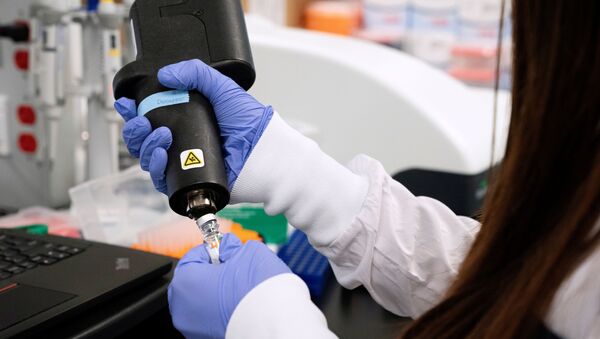According to Pentagon spokesperson Jonathan Hoffman, researchers at the US Army Medical Research Institute of Infectious Diseases have started testing the vaccine prototype on primates. The DoD is currently involved in five clinical vaccine trials for COVID-19, Military.com reported.
However, Air Force Brig. Gen. Dr. Paul Friedrichs, joint staff surgeon for the Joint Chiefs of Staff, clarified Monday that the DoD is “still months away, not weeks away, from a vaccine.”
The US military is also testing medications that could potentially reduce coronavirus symptoms or the length of infection. Such trials may yield useful treatments sooner than vaccine tests, according to Friedrichs.
One treatment undergoing DoD trials is hydroxychloroquine, an antiparasitic that can be used to treat malaria in addition to lupus and arthritis. Hydroxychloroquine has been touted by US President Donald Trump in recent weeks as being greatly effective against the virus. So far, evidence that the drug works to treat COVID-19 is mostly anecdotal, although a study by French researchers released last month found that the drug is effective in some cases.
According to a study by researchers at IHU-Méditerranée Infection in Marseille, France, patients who took those the drug in combination with azithromycin “showed a significant reduction of the viral carriage” six days after treatment began and a “much lower average carrying duration” in comparison to untreated patients. The researchers recommend that 200 milligrams of hydroxychloroquine be provided to patients three times a day for 10 days in addition to 500 milligrams of azithromycin on the first day and then 250 milligrams per day for five days for the treatment to be effective.
However, officials like Dr. Anthony Fauci, director of the US National Institute of Allergy and Infectious Diseases, have repeatedly stated that the medications like hydroxychloroquine and azithromycin need to be tested further to determine their effectiveness against COVID-19. In some cases, hydroxychloroquine can cause negative health effects in those with chronic heart or blood pressure problems.
"The data are really, just, at best, suggestive," Fauci said on CBS' "Face the Nation" Sunday.
"There have been cases that show there may be an effect, and there are others to show there's no effect. So, I think in terms of science, I don't think we could definitively say it works,” Fauci added.
Last week, a team of Israeli scientists said they anticipate having a COVID-19 vaccine that could be tested on humans as soon as June 1. The Israel Institute for Biological Research (IIBR) also revealed last Tuesday that it had started testing a COVID-19 vaccine on rodents at its biochemical defense laboratory. In addition, CanSino Biologics in China, Moderna and INOVIO Pharmaceuticals in the US and CureVac and BioNTech in Germany are all racing to develop vaccines against the virus, which has infected almost 1.4 million people globally and killed more than 81,000.



